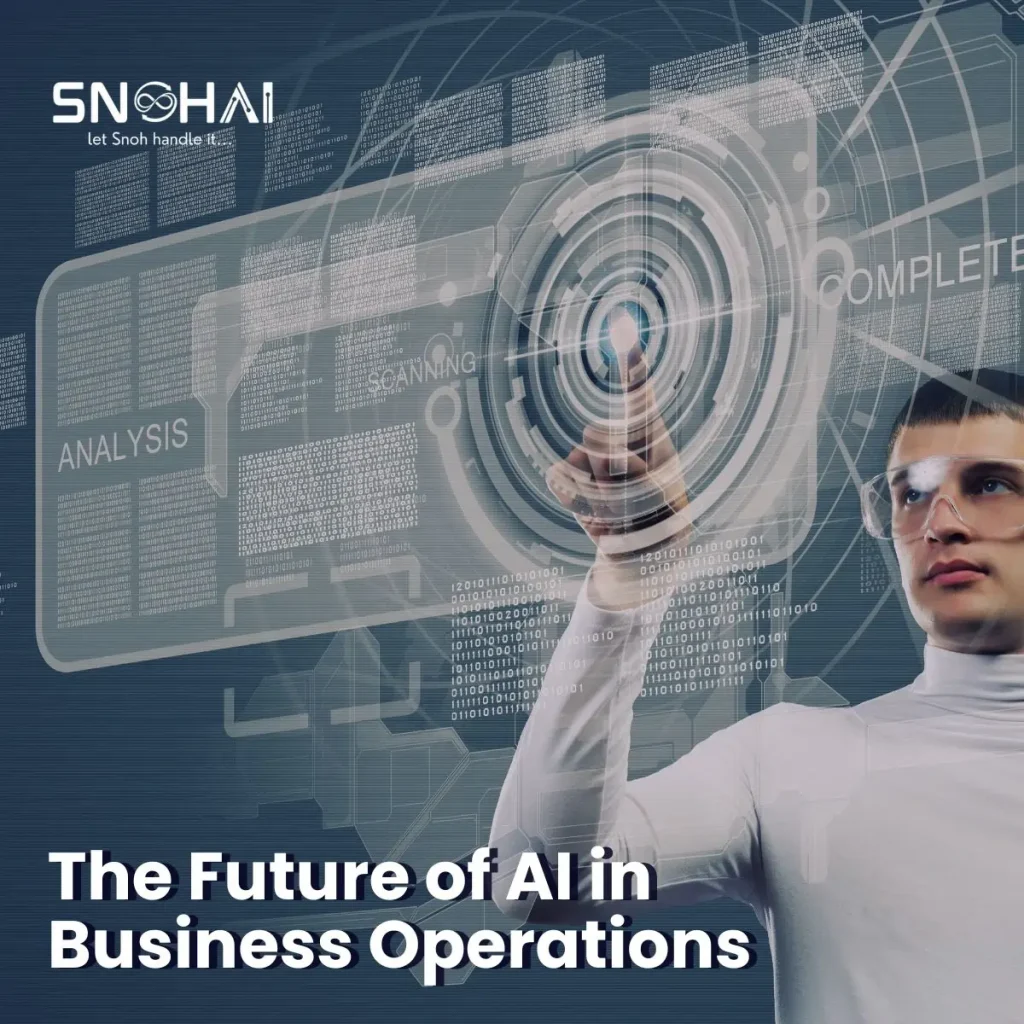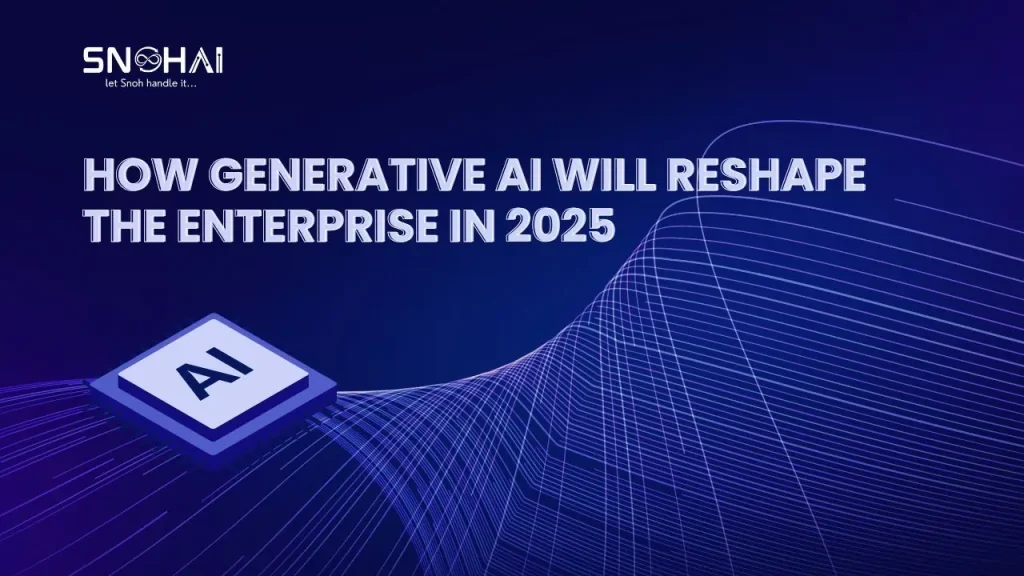With 2025 at the door, the global business community is at the threshold of a radical change that is brought forth by the advent of superior technologies. First, at the top is generative AI in enterprise, which will transform the way organizations run, innovate, and compete. This article explores how generative AI will reshape the enterprise, drawing on current trends and practical insights to help leaders understand its potential. In efficiency and opening up new opportunities, generative AI is going to be an established component in the business strategy, and complex tasks will be easier and accessible to all.
The Rise of Generative AI in Enterprise
Generative AI has become a sought-after enterprise solution; it has advanced quickly since its dawn as an experimental tool. At the beginning of 2025, enterprises are not only implementing pilots but are shifting to full-scale implementations with the emphasis on value creation. The technology applies superior models to create content, automate functions and processes, and provide insights that resemble the sense of creativity and reason of humankind.
As an example, firms are implementing generative AI into their everyday workflow to complete mundane tasks such as writing reports or constructing prototypes. They are moving forward due to the pressures of increased productivity in the economy. The increasing adoption level is causing organizations to spend more on AI, with most having specific budgets dedicated to implementation. The trick should be how it can be connected with the current systems, and that AI should boost the operations, but not disturb them. At Snohbricks Technology, we view this as a chance to make AI practical and user-friendly and enable businesses to automate document management and data processing efficiently.
Key Generative AI Use Cases in Enterprise
Delving into the applications of generative AI in business, it is possible to figure out that there is a great number of use cases that have boosted different industries. Customer service: Human customer service employees and chatbots are powered by AI to respond to customers in a personalized manner, decrease wait times, and increase satisfaction. Generative AI helps the marketing teams make personalised content, e.g. emails and social media posts.
Generative AI serves as an accelerant in research and development, through simulation and generation of ideas relating to new products. Predictive analytics helps supply chain management forecast the demands and optimize stocks. AI is used in the healthcare business in creating patient reports or drug discovery simulations and in finance to detect fraud and monitor risk.
Besides saving expenses, these generative AI applications in enterprises can also promote creativity. Indicatively, media companies produce realistic soundtracks and visuals, which make the production faster. The similarity is that AI can process multimodal data, such as text, images, and audio, making it flexible in business applications.
Learn More: Generative AI use cases for the enterprise
The Impact of Generative AI on Business Operations
The impact of generative AI on business is profound, touching every aspect of operations. The biggest highlight is the gain in productivity as employees save hours of repetitive work and can work on strategic work. Research supports trillions of potential economic worth that which is inspired by efficiency and innovation.
But this effect of generative AI in business also introduces such challenges as skills gaps and data quality. Businesses need to have training so that teams can work synergistically with AI. Governance is important to resolve such risks as biases or security concerns. On the positive side, AI contributes to sustainability by maximising energy consumption in operations and supply chains.
By 2025, the future of AI in business processes appears agentic, with AI taking charge of actions such as scheduling or decision-making. The evolution will eliminate hierarchies and make businesses and responses much agile.
Navigating Enterprise AI Transformation
The AI transformation in an enterprise has to be thoughtful. To guarantee success, leaders must begin with areas that have high impact and overlay AI onto processes that are already in place so they can realize fast wins. It is imperative to develop the data pillar since clean data drives effective AI results.
The main role of change management is in driving the business through AI. The promotion of a learning culture would also ensure that the employees can view AI as an ally rather than a threat. Cooperation with providers of AI can provide solutions tailored to their needs, which makes them scalable and secure.
By transforming enterprise AI, business transformation through AI reimagined workflows can be reached. As a case in point, the automation of back-office operations releases funds in support of expansion programs. The target is balanced adoption- the use of AI power without human control.
The Future of AI in Business Operations

The future of AI in business processes will also be positive as industry-specific models will become mainstream. Multimodal AI will be used in more difficult tasks, such as creating a video based on a text prompt, and improving cross-team cooperation.
Future ethical considerations will determine this future as regulation will be seeking transparency. Businesses that are responsible in AI will have an advantage and trust. Finally, generative AI will make innovation be democratic and, therefore, available to companies of all scales.
Conclusion
To conclude, the ways in which generative AI will transform the enterprise include efficiency gains, innovative ways of application, and strategic changes. Making generative AI part of the enterprise will be a must in staying ahead when time runs through the year 2025. To facilitate this journey, we at Snohbricks Technology implement secure and efficient AI such as our AI based automation tools. Enterprises can achieve sustainable value and flourish in an AI world, all by prioritizing viable integration and human-to-AI teamwork.
FAQs
What is the main impact of generative AI on business in 2025?
Generative AI gives productivity enhancements through process automation and the creation of insights, which provide cost reductions and speed increases in innovation. It impacts such areas as customer service and marketing, and allows businesses to promptly react to changes in the market and solve issues such as data governance.
How can companies start their enterprise AI transformation?
Make a start with different high-value use cases, e.g., content creation or process automation, and combine AI with current systems. Consider investing in your worker training and hiring trusted suppliers to enable a successful and measurable ROI AI-enabled transformation of your business.
What are some common generative AI use cases in the
enterprise?
Generative AI can be used in personalized marketing by enterprises, predictive supply chain analytics, and automated customer service. The applications help to simplify processes and improve decision-making, and are therefore mandatory to gain a competitive advantage.
What does the future of AI in business operations hold?
The future entails agentic artificial intelligence coping with autonomous assignments and multimodal modeling of intricate data. It will lead to sustainable growth and innovation in businesses through ethical deployment to establish trust.
What role does generative AI play in the enterprise in terms of
improving efficiency?
It offloads repetitive tasks, including the generation of reports and data analysis, so that teams are allowed to be creative. This adds to the productivity and resource distribution that makes the traditional workflow smarter and more responsive systems.

